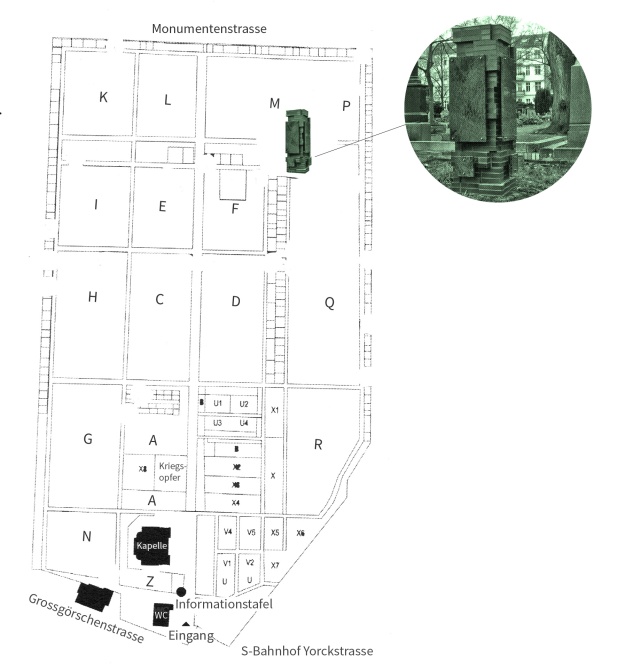Old St. Matthäus Cemetery – visible queer mourning

Contact between AIDS activists and members of the Lutheran church comes about early on in the response to HIV/AIDS in Germany.¹ Despite religious leaders’ (Lutheran church leaders included) ambivalent response to the topic of HIV/AIDS particularly in connection with Queer people, parishes like the inner-city Twelve-Apostles Parish in Berlin-Schönberg become active early on in the grassroots response to the realities of living and dying with the virus.
Beginning in the late 1990s, AIDS activist, “Tunte” and former O-Ton Pirat Ichgola Androgyn (aka: Bernd Boßmann) and others, along with members of the Twelve-Apostles Parish make it possible for people who have died with AIDS to be laid to rest in the old St. Matthäus Cemetery (link to more comprehensive German language Wikipedia article). Since 2000 the non-profit Denk mal PositHIV e.V. has taken on the custodianship of the graves of people who died with AIDS. The original shared plot with a names plaque created in 2000 at the old St. Matthäus Cemetery was expanded in 2015, and a small monument by the artist Jorn Ebner was added in 2015.²
Bernd Boßmann opened Café Finovo in the former grounds keeper’s house of the old St. Matthäus Cemetery in Berlin-Schöneberg, in 2006 as a community space and an place for queer mourning.

❦
Addresses:
Café “finovo”
Alter St.-Matthäus-Kirchhof
Großgörschenstr. 12-14
10829 Berlin
Proprietor: Bernd Boßmann
http://www.cafe-finovo.de/
Denk mal positHIV e. V.
c/o Dorothea Strauß
Gierkeplatz 4
10585 Berlin
Board: Eugen Januschke, Olaf Rönitz, Dorothea Strauß
https://denk-mal-posithiv.de/
Scherhag-SteinmetzwerkstättenGmbH
Kolonnenstraße 42
10829 Berlin
Management: Tobias Eidner
https://scherhag-gmbh.de/
Cemetery contact:
Location:
Alter St.-Matthäus-Kirchhof
Großgörschenstr. 12-14
10829 Berlin
https://www.zwoelf-apostel-berlin.de/
Administration:
Zwölf-Apostel-Kirchhofsverwaltung
Kolonnenstraße 24-25
10829 Berlin
Administration: Felix Milkereit (manager), Susanne Krüger (burials), Bertram von Boxberg (public and press liaison), Andreas Schörding (grounds), Wolfgang Schindler (archivist and grave sponsorship)
https://www.zwoelf-apostel-berlin.de/
Memorial location on cemetery map:

Sources:
1) Kaelberlah, Juliane: About Blank: Ein Ort der Trauer und des Gedenkens, On: franziskaner.net, Dated: March 02 2020, URL: https://franziskaner.net/kirche-posithiv-abschied/, Last viewed: March 10 2024.
2) Schock, Axel: KIRCHE positHIV beendet Arbeit nach 26 Jahren – Dank- und Abschiedsgottesdienst für die ökumenische Aids-Initiative, On: magazin.hiv (Gesellschaft & Culture), Dated: Oct 18 2015, URL: https://magazin.hiv/magazin/gesellschaft-kultur/ein-ort-der-trauer-und-des-gedenkens/, Last viewed: March 10 2024.


















